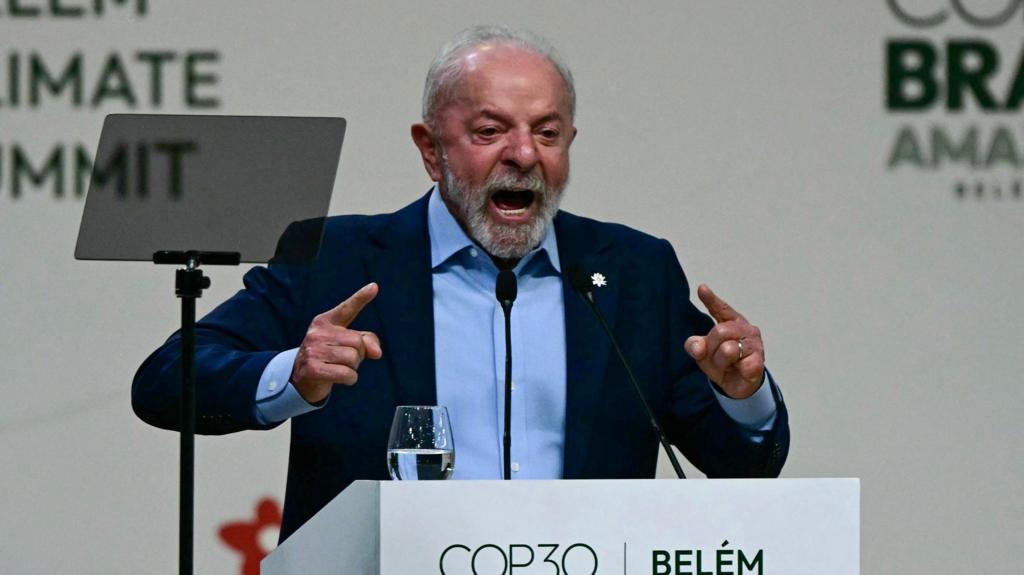President Trump faced criticism on Thursday as world leaders convened ahead of the COP30 summit, voicing concerns over his climate change policies.
The former U.S. leader, notably absent from the gathering in Belém, Brazil, was accused of undermining climate science and hindering global progress through the rollback of key environmental regulations.
UK Prime Minister Sir Keir Starmer noted a shift in political consensus on the issue, observing that climate change, once a unifying concern, has become a point of contention.
Over the next two weeks, participating nations will engage in negotiations aimed at forging a new climate agreement, with a particular emphasis on increasing financial support for forest conservation efforts.
Several prominent world leaders from nations including India, Russia, the U.S., and China were absent from this year’s summit.
While President Trump did not attend the meeting in Belém, his views on climate change were a clear point of reference for many leaders present.
During a UN address in September, the former U.S. president labeled climate change “the greatest con job ever perpetrated on the world” and rejected the feasibility of renewable energy.
He stated, “The entire globalist concept, asking successful industrialised nations to inflict pain on themselves and radically disrupt their entire societies, must be rejected completely and totally.”
Without directly naming the former U.S. leader, President Luiz Inácio Lula da Silva of Brazil warned against “extremist forces that fabricate fake news and are condemning future generations to life on a planet altered forever by global warming”.
The leaders of Chile and Colombia went further, directly refuting the U.S. president and urging other nations to disregard U.S. efforts to withdraw from climate action.
Chile’s environment minister, Maisa Rojas, stated to the BBC: “The science is very clear. It is very important not to falsify the truth.”
While criticizing Trump resonated with the audience, securing consensus on new climate action measures proved more challenging.
Attendance in Belém was limited, and a majority of countries have yet to submit revised plans for reducing carbon emissions, which are widely recognized as the primary cause of rising global temperatures.
Despite UK Prime Minister Sir Keir Starmer acknowledging diminishing global political support for climate initiatives, he affirmed to those present: “My message is that the UK is all-in.”
However, in a setback for the Brazilian hosts, the UK withdrew from its $125bn (£95bn) fund supporting the world’s rainforests on Wednesday night.
President Lula had hoped to raise $25bn for the Tropical Forests Forever Facility from public sources, mainly from developed countries such as the UK, to support governments and communities protecting rainforests like the Amazon and the Congo Basin.
The protection of these ecosystems is considered crucial for combating climate change, as they store billions of tonnes of planet-warming gases and host half of the planet’s species, despite covering only 6% of the world’s land.
The UK’s decision has been met with surprise, given its prior involvement in the fund’s design and its global commitment for countries to halt deforestation by 2030, launched during the COP summit in Glasgow in 2021.
Lord Zach Goldsmith, who worked on the issue as former environment minister, told the BBC’s PM programme: “The assumption was that the UK would be a leading participant and at the last minute the UK has walked away. It has caused real frustration to put it mildly here in Brazil… the Brazilian government behind the scenes is furious.”
The decision also appears inconsistent with the stance of the Prince of Wales, who, in his address to leaders on Thursday, hailed the fund as “a visionary step toward valuing nature’s role in climate stability” and shortlisted it for his £1m Earthshot Prize.
Prince William urged leaders to overcome their differences and advance with climate action.
“I have long believed in the power of urgent optimism: the conviction that, even in the face of daunting challenges, we have the ingenuity and determination to make a difference, and to do so now,” he said.
He appealed to them to take action for the sake of future generations.
“Let us rise to this moment with the clarity that history demands of us. Let us be the generation that turned the tide – not for applause, but for the quiet gratitude of those yet to be born,” he said.
From Monday, countries will spend two weeks negotiating further action on climate change – with crucial questions on how to raise finance previously pledged for those already affected by the worst impacts of climate change.
The last few weeks have seen devastating extreme weather globally.
Hurricane Melissa, which hit the Caribbean last week, is one of the strongest the island nations have ever experienced – resulting in the deaths of more than 75 people.
Recent analysis from Imperial College has suggested that climate change increased the extreme rainfall associated with the Category 5 hurricane by 16%.
Additional reporting by Ione Wells and Justin Rowlatt.
Sign up for our Future Earth newsletter to keep up with the latest climate and environment stories with the BBC’s Justin Rowlatt. Outside the UK? Sign up to our international newsletter here.

